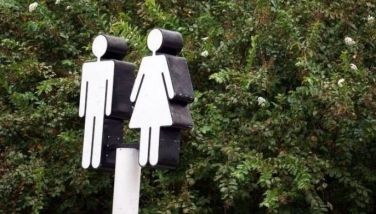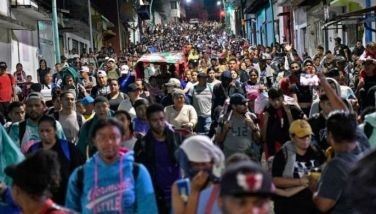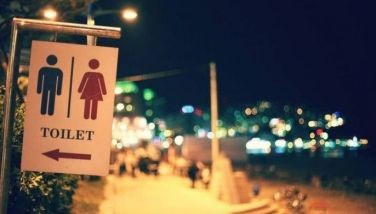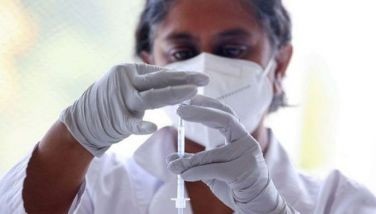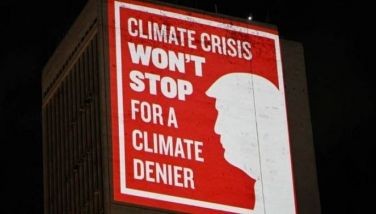Grim economic data reveals virus devastation
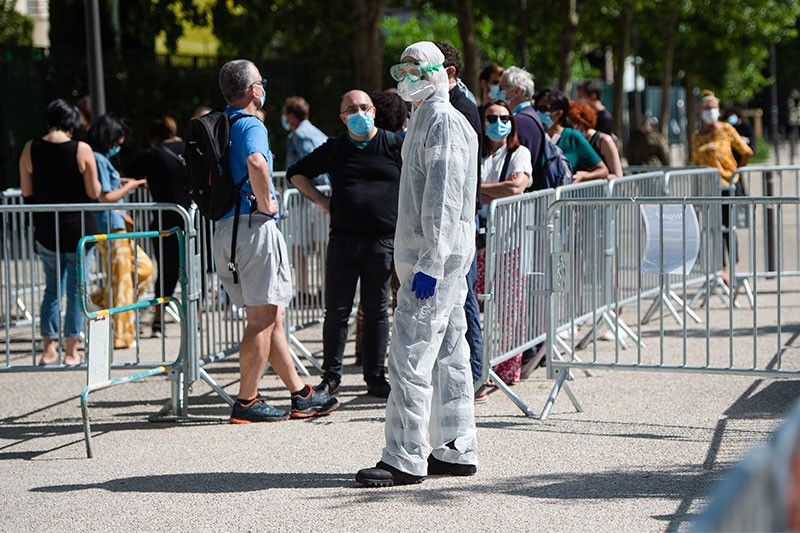
LONDON, United Kingdom — A new raft of bleak economic data laid bare the crippling worldwide impact of the coronavirus pandemic on Thursday, as hard-hit Europe moved to further ease lockdown measures in a bid to get people back to work.
The United States said another 3.2 million people filed unemployment claims last week, while Germany and France reported major slumps in industrial production and Britain said its economic output would plummet by 14 percent this year.
A top Brazilian minister warned that Latin America's biggest economy — and the region's virus epicenter — risked "collapse" if stay-at-home measures were not soon lifted.
Nations around the world are under huge pressure to ease the economic pain caused by measures to halt the spread of the virus, which has claimed more than 266,000 lives, infected 3.8 million and left half of humanity under some form of lockdown.
Across Europe, many countries are now easing restrictions, with some shops and schools re-opening across the region, Italy allowing Catholics to soon attend mass, and Norway to open up pubs on June 1.
US President Donald Trump is also pushing for lockdowns to be lifted, as he tries to steady the world's largest economy before voters head to the polls in November.
"This country can't stay closed and locked down for years," he said Thursday at a meeting with Texas Governor Greg Abbott, whose state was one of the first to lift stay-at-home rules.
But experts have warned that social distancing will remain necessary until a vaccine is developed -- and governments are keen to avoid a devastating second wave of infections.
Britain was on Thursday reviewing lockdown measures, with Prime Minister Boris Johnson expected to offer a roadmap on easing restrictions on Sunday.
Johnson — who himself was hospitalised for COVID-19, the disease caused by the virus — said: "We will proceed with maximum caution".
Trouble for tourism
The easing has already begun in Germany, Europe's largest economy, while France is due on Monday to start emerging from a lockdown that began in mid-March.
But French Prime Minister Edouard Philippe said four regions including the greater Paris area would see a more limited easing of restrictions as the number of cases "remains high — higher than we would have hoped".
Economists have been warning for weeks that the pandemic will lead to the worst global economic downturn since the Great Depression of the 1930s, and new data are revealing the extent of the damage.
Beyond the US jobless figures, Germany said its industrial production fell by 9.2 percent month-on-month in March, while in France it dropped 16.2 percent.
In Brazil, Economy Minister Paulo Guedes said the country could begin to face food shortages in a month's time and "production may become disorganized, leading to a system of economic collapse, of social disorder."
Brazil has been hit hard by the pandemic, with more than 135,000 cases and 9,146 deaths. That is more than half the 16,000 deaths in all of Latin America.
Globally, airlines and travel are among the sectors worst hit by the pandemic, with flights grounded worldwide and social distancing measures severely limiting leisure and business trips.
The World Tourism Organization said Thursday that the number of international tourist arrivals will plunge by 60 to 80 percent in 2020 because of the pandemic.
Cruise lines, shut down because of the pandemic, are still struggling to repatriate tens of thousands of crew members stranded aboard ships at sea.
"We are desperate to get home," says Jessica Furlan, who works on the Celebrity Infinity, which is in limbo somewhere between Florida and the Bahamas.
Moscow extends lockdown
Most of Europe has seen a significant drop in the number of new infections and deaths from the virus, but cases are on the rise in Russia.
On Thursday, it reported another record increase with more than 11,000 new infections.
Moscow Mayor Sergei Sobyanin announced that lockdown measures would be extended in the capital until May 31.
The United States remains the hardest-hit country, with more than 1.25 million cases and over 75,000 deaths. More than 2,400 deaths were reported in the past 24 hours, according to Johns Hopkins University.
But Trump has said it is crucial to re-open the shuttered economy.
The new jobless claims announced Thursday bring the total to a staggering 33.5 million newly unemployed since mid-March.
"We will vanquish the virus, we will defeat the enemy. We will not fail," Trump said.
Also Thursday, the White House said a military aide — reportedly working as a valet for Trump — had tested positive for coronavirus, but the president has not been infected.
Minorities at higher risk
Scientists are not only working hard to produce a vaccine to combat the novel coronavirus but also to determine all of the symptoms it provokes.
"At the outset, we were told to watch out for headaches, fever and a light cough," recalls Sylvie Monnoye, a family doctor in central Paris for nearly three decades.
"Then they added a runny nose and a scratchy throat. After that, digestive problems, including stomach aches and severe diarrhoea," she added.
"We started to think that we should suspect everything," said Monnoye, dressed from head-to-toe in protective wear.
In Britain, studies have shown that ethnic minorities are at much greater risk from the pandemic, with the Office for National Statistics saying black men and women were more than four times more likely to die with coronavirus than white people in England and Wales.
In Brazil, a similar pattern has emerged, with blacks dying at a higher rate, statistics show.
Follow this page for updates on a mysterious pneumonia outbreak that has struck dozens of people in China.
New Zealand Prime Minister Chris Hipkins says on Sunday that he had contracted COVID-19, testing positive at a key point in his flailing campaign for re-election.
Hipkins saYS on his official social media feed that he would need to isolate for up to five days -- less than two weeks before his country's general election.
The leader of the centre-left Labour Party said he started to experience cold symptoms on Saturday and had cancelled most of his weekend engagements. — AFP
The World Health Organization and US health authorities say Friday they are closely monitoring a new variant of COVID-19, although the potential impact of BA.2.86 is currently unknown.
The WHO classified the new variant as one under surveillance "due to the large number (more than 30) of spike gene mutations it carries", it wrote in a bulletin about the pandemic late Thursday.
So far, the variant has only been detected in Israel, Denmark and the United States. — AFP
The World Health Organization says on Friday that the number of new COVID-19 cases reported worldwide rose by 80% in the last month, days after designating a new "variant of interest".
The WHO declared in May that Covid is no longer a global health emergency, but has warned that the virus will continue to circulate and mutate, causing occasional spikes in infections, hospitalisations and deaths.
In its weekly update, the UN agency said that nations reported nearly 1.5 million new cases from July 10 to August 6, an 80% increase compared to the previous 28 days. — AFP
The head of US intelligence says that there was no evidence that the COVID-19 virus was created in the Chinese government's Wuhan research lab.
In a declassified report, the Office of the Director of National Intelligence (ODNI) says they had no information backing recent claims that three scientists at the lab were some of the very first infected with COVID-19 and may have created the virus themselves.
Drawing on intelligence collected by various member agencies of the US intelligence community (IC), the ODNI report says some scientists at the Wuhan lab had done genetic engineering of coronaviruses similar to COVID-19. — AFP
Boris Johnson deliberately misled MPs over Covid lockdown-breaking parties in Downing Street when he was prime minister, a UK parliament committee ruled on Thursday.
The cross-party Privileges Committee said Johnson, 58, would have been suspended as an MP for 90 days for "repeated contempts (of parliament) and for seeking to undermine the parliamentary process".
But he avoided any formal sanction by his peers in the House of Commons by resigning as an MP last week.
In his resignation statement last Friday, Johnson pre-empted publication of the committee's conclusions, claiming a political stitch-up, even though the body has a majority from his own party.
He was unrepentant again on Thursday, accusing the committee of being "anti-democratic... to bring about what is intended to be the final knife-thrust in a protracted political assassination".
Calling it "beneath contempt", he said it was "for the people of this to decide who sits in parliament, not Harriet Harman", the veteran opposition Labour MP who chaired the seven-person committee. — AFP
- Latest
- Trending
















